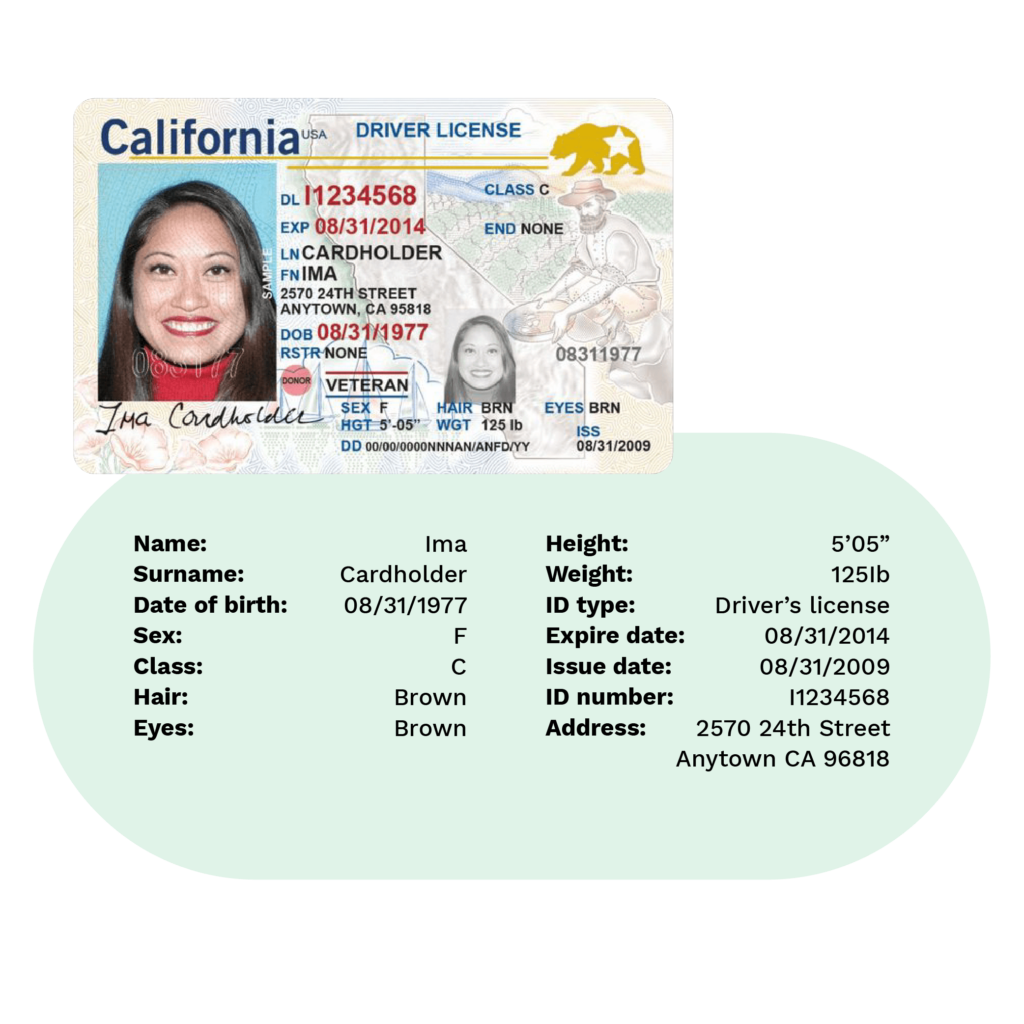Driver’s license verification confirms the validity of a driver’s license. It helps ensure the driver is legally allowed to drive.
Driver’s license verification is crucial for businesses and organizations that need to confirm the legality of their drivers. This process helps to prevent fraud and ensures that the individual holds a valid and current driver’s license. Verifying a driver’s license can protect companies from liability issues and maintain safety standards.
It involves checking the license number, expiration date, and other relevant details. Modern verification systems offer quick and accurate results, enhancing efficiency. By implementing regular driver’s license verification, companies can ensure compliance with legal requirements and promote road safety. This simple yet effective process is essential for any business relying on drivers.

Importance Of Driver’s License Verification
Driver’s license verification is crucial. It ensures the driver is qualified. It also helps in maintaining road safety. This process protects everyone on the road.
Safety And Security
Safety and security are top priorities. Verifying a driver’s license ensures the driver is trained. This minimizes road accidents. It ensures drivers follow traffic rules. Security is also improved. It helps in identifying fake licenses. This reduces the risk of illegal activities. It ensures only qualified drivers are on the road.
Regulatory Compliance
Regulatory compliance is essential. Verifying licenses ensures drivers meet legal standards. This helps in avoiding fines and penalties. It keeps the transport system lawful. Compliance also builds trust. Companies can assure their clients of safety. It enhances the reputation of transport services. It ensures smooth operation without legal troubles.
| Benefits | Details |
|---|---|
| Safety | Reduces road accidents and ensures traffic rules are followed. |
| Security | Identifies fake licenses and reduces illegal activities. |
| Compliance | Meets legal standards and avoids fines. |
Common Methods Of Driver’s License Verification
Driver’s license verification is crucial for ensuring identity and authenticity. There are several methods to verify a driver’s license. These methods can be broadly categorized into manual and digital solutions. Each method has its own set of advantages and processes.
Manual Inspection
Manual inspection is a traditional method of verifying driver’s licenses. This involves physically examining the license for signs of authenticity.
- Check the hologram on the license.
- Inspect the microprint text.
- Look for any alterations or tampering.
- Verify the photo matches the individual.
Manual inspection requires trained personnel to identify fake licenses. It can be time-consuming but effective if done properly.
Digital Solutions
Digital solutions offer a modern approach to driver’s license verification. These methods use technology to verify licenses quickly and accurately. Common digital solutions include:
- Barcode scanning: Scans the barcode on the license to retrieve data.
- OCR technology: Optical Character Recognition reads text from the license.
- Database verification: Compares license data with a government database.
- Mobile apps: Use smartphone apps to verify licenses instantly.
Digital solutions provide faster and more reliable verification. They minimize human errors and streamline the verification process. Integrating digital solutions enhances security and efficiency in license verification.
Key Features To Check
Driver’s license verification is vital to ensure authenticity. Knowing key features helps identify genuine licenses. Focus on these aspects to verify a driver’s license accurately.
Holograms And Watermarks
Holograms are embedded into the license. They change appearance when viewed from different angles. These holograms are hard to copy, making them reliable. Watermarks are another security feature. They are usually visible when held up to the light. Watermarks are unique and add another layer of security.
Barcode And Magnetic Stripe
Barcodes contain encoded information. Scanning these barcodes reveals the data. If the data matches the printed information, the license is likely real. Magnetic stripes store data just like a credit card. Swiping the stripe in a reader will display the stored information. The data should match the printed details on the license.
| Feature | Description |
|---|---|
| Hologram | Changes appearance with angle |
| Watermark | Visible under light |
| Barcode | Encodes information |
| Magnetic Stripe | Stores data like a credit card |
Technological Advancements
The process of verifying driver’s licenses has evolved. Technology plays a significant role in making this process more accurate and efficient. Modern innovations help to reduce errors and fraud. Two major technological advancements are AI and Machine Learning and Blockchain Technology.
AI And Machine Learning
Artificial Intelligence (AI) and Machine Learning are game-changers. They help to identify fake licenses quickly. AI can scan and verify documents in seconds. Machine Learning algorithms learn from data. They improve accuracy with each scan.
- Real-time Verification: AI checks licenses instantly.
- Error Reduction: Machine Learning reduces human error.
- Fraud Detection: AI identifies suspicious patterns.
These technologies make driver’s license verification fast and reliable. They ensure that only authentic licenses get approved.
Blockchain Technology
Blockchain Technology is another breakthrough. It offers a secure way to store and verify data. Blockchain is decentralized, making it tamper-proof.
| Feature | Benefit |
|---|---|
| Decentralization | Prevents data tampering |
| Transparency | Ensures data integrity |
| Security | Protects sensitive information |
Blockchain technology ensures that driver’s license data is secure. It makes the verification process trustworthy.
Challenges In Verification
Counterfeit Licenses
Counterfeit licenses are a major issue. Fake IDs are easy to make. Criminals use them to bypass checks. This puts public safety at risk. Authorities struggle to spot fake licenses. Advanced technology is used to create these fakes. This makes detection very hard. Law enforcement needs better tools to combat this problem.Data Privacy Concerns
Data privacy concerns are growing. Personal data is at risk during verification. Hackers target this data for misuse. Organizations must protect this sensitive information. Strong encryption and secure systems are crucial. Users worry about their data being shared or stolen. A table outlining key privacy measures:| Measure | Description |
|---|---|
| Encryption | Protects data by converting it into code. |
| Access Control | Limits who can view or use data. |
| Regular Audits | Checks systems for security weaknesses. |
Best Practices For Driver’s License Verification
Driver’s license verification is crucial for safety and security. Verifying these documents helps prevent fraud and ensures compliance with regulations. Implementing best practices can streamline the process and improve accuracy.
Regular Training
Regular training is essential for staff involved in verification. Well-trained staff can spot fake licenses and identify discrepancies quickly. This reduces the risk of errors and enhances security.
- Conduct training sessions every quarter.
- Use real and fake licenses for practice.
- Update staff on new verification techniques.
Use Of Reliable Tools
Reliable tools make the verification process efficient and accurate. High-quality scanners and software detect fake licenses effectively. Investing in these tools saves time and reduces human error.
| Tool | Function |
|---|---|
| Scanner | Scans and captures license details. |
| Verification Software | Checks license authenticity. |
| Database Access | Compares license data with official records. |
Always keep your tools updated for best results. Regular maintenance and updates ensure tools work effectively.
Legal Implications
Driver’s license verification is crucial for businesses. It helps in ensuring that drivers are legally authorized to operate vehicles. Failure to comply with legal standards can lead to severe consequences. This section will explore the legal implications of non-compliance and the associated risks.
Penalties For Non-compliance
Non-compliance with driver’s license verification laws can result in hefty fines. Here are some of the penalties businesses might face:
- Monetary Fines: Businesses may face fines ranging from $1,000 to $10,000.
- License Suspension: Operating licenses can be suspended for non-compliance.
- Legal Actions: Companies might face lawsuits from affected parties.
Liabilities And Risks
Failing to verify driver’s licenses can expose businesses to significant risks. Below are some potential liabilities:
| Risk | Impact |
|---|---|
| Accidents | Higher liability if the driver is unlicensed |
| Insurance | Claims may be denied if the driver is not verified |
| Reputation | Damage to the company’s public image |
Businesses need to understand these risks. Ensuring compliance can save time and money.
Future Trends
The future of Driver’s License Verification looks promising with advanced technologies. These innovations aim to enhance security and streamline processes. Let’s explore some key future trends in this domain.
Integration With Biometrics
Biometric technologies are revolutionizing driver’s license verification. Fingerprint scanning and facial recognition ensure accurate identity verification. This reduces the risk of fraud and unauthorized access. Below is a table showing common biometric methods and their benefits:
| Biometric Method | Benefit |
|---|---|
| Fingerprint Scanning | High accuracy and reliability |
| Facial Recognition | Contactless and convenient |
| Retina Scanning | Extremely secure |
Global Standardization
Global standardization will ensure uniformity across borders. This makes international travel and verification easier. Efforts are being made to create universal protocols. This helps in recognizing driver’s licenses worldwide. Governments and organizations collaborate to achieve this goal. Some benefits of global standardization include:
- Streamlined verification processes
- Enhanced security and fraud prevention
- Ease of use for international drivers
These trends signal a significant shift in driver’s license verification. The future holds great promise for a more secure and efficient system.
Frequently Asked Questions
Can I Look Up My Texas Driver’s License Online?
No, you can’t look up your Texas driver’s license online. Visit the Texas Department of Public Safety for assistance.
How Do I Verify My Us Driver’s License?
Visit your state’s DMV website. Complete the online verification form. Submit required documents, such as your license number. Receive confirmation. Contact DMV for assistance if needed.
How Do I Verify A Driver’s License In Illinois?
To verify a driver’s license in Illinois, visit the Illinois Secretary of State’s website. Use the online services to check the license status. Provide the required information, such as license number and personal details. This ensures accurate verification.
How To Check Missouri Driver’s License Status?
Visit the Missouri Department of Revenue website. Use the online portal to check your driver’s license status. Provide required personal information.
What Is Driver’s License Verification?
Driver’s license verification confirms the validity of a driver’s license.
Why Is Driver’s License Verification Important?
It ensures the driver is legally allowed to drive.
How Is Driver’s License Verification Done?
It is done through online databases or government agencies.
Conclusion
Verifying a driver’s license is crucial for safety and compliance. It ensures trust and prevents fraud. Make sure to follow proper verification procedures. This process protects both employers and the public. Always stay updated with the latest verification methods to maintain security and accuracy.


One Reply on “Driver’s License Verification Technology: A Complete Guide in 2024”